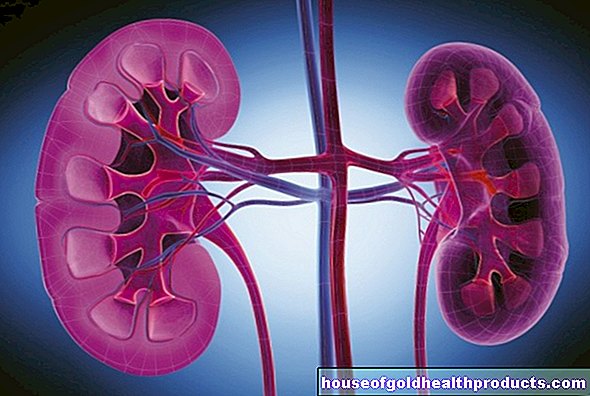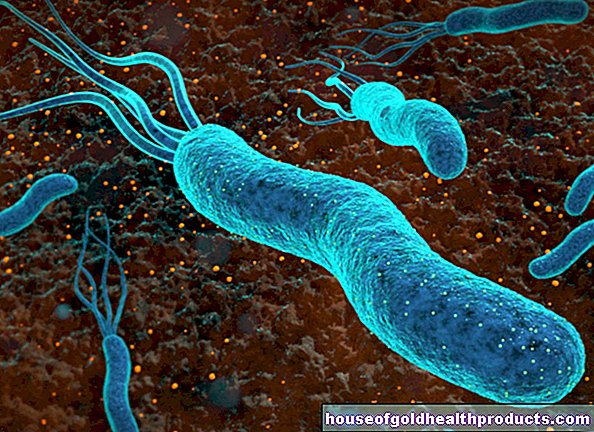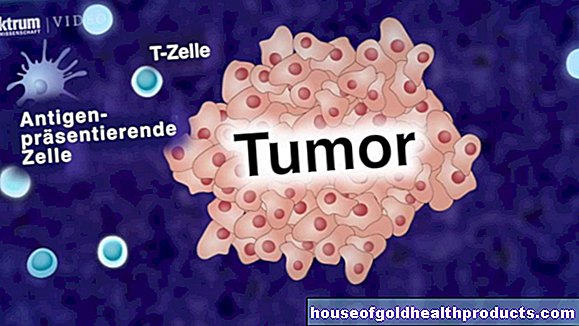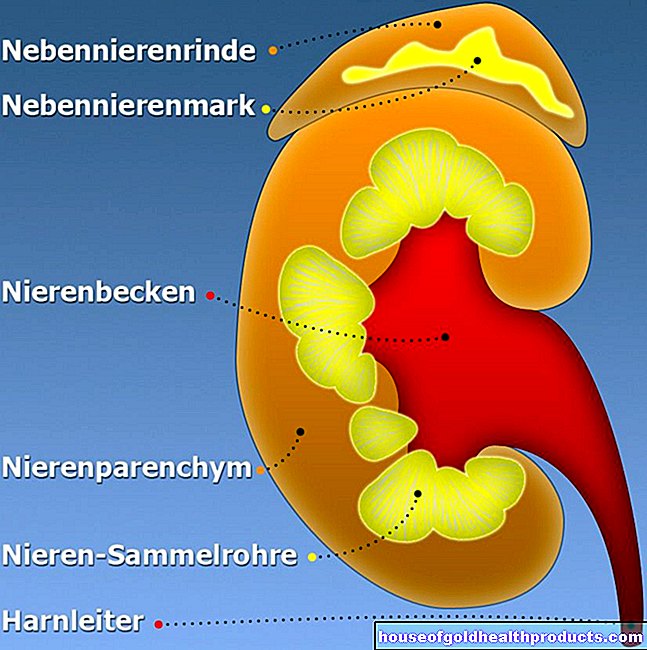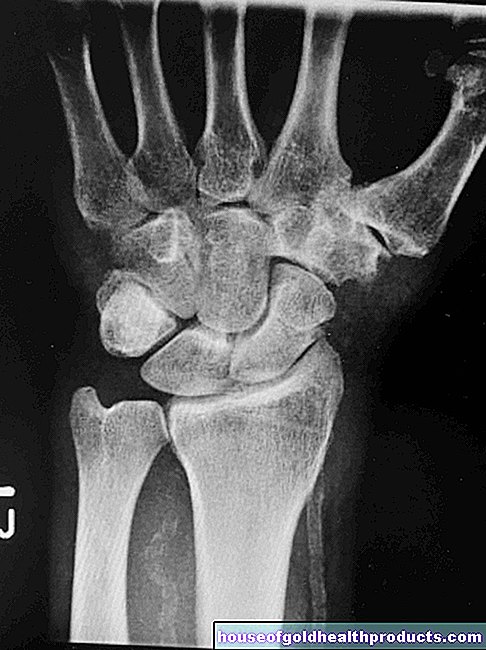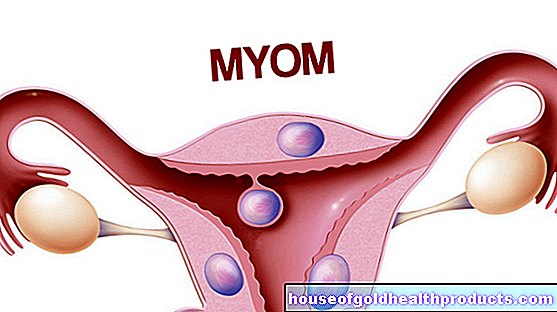Nephrotic Syndrome
All content is checked by medical journalists.A nephrotic syndrome is a combination of various symptoms that are caused by damage to the kidneys. If the kidney corpuscles can no longer perform their function, typical symptoms such as excessive protein loss through the urine and water retention in the tissue (edema) occur. Both children and adults can develop nephrotic syndrome.
ICD codes for this disease: ICD codes are internationally recognized codes for medical diagnoses. They can be found, for example, in doctor's letters or on certificates of incapacity for work. N04E78R60R80
Nephrotic syndrome: description
A nephrotic syndrome does not describe an independent clinical picture. Rather, the term stands for the common occurrence of certain symptoms and complaints, the cause of which lies in an impaired function of the kidneys. A pathological loss of protein via the urine (proteinuria) is characteristic of a nephrotic syndrome. This loss of protein then leads to other symptoms such as water retention in the tissue and an increase in blood lipid levels. Nephrotic syndrome can affect both children and adults.
Nephrotic syndrome: symptoms
Nephrotic syndrome produces characteristic symptoms. In particular, they can be traced back to the loss of important proteins. Typically, a nephrotic syndrome is mainly associated with the following symptoms:
- Protein in the urine (proteinuria): Those affected often notice that their urine foams a lot.
- Water retention in the tissue (edema): A nephrotic syndrome causes edema in particular in the face (especially in the area of the eyelids) and on the feet, ankles and lower legs.
- Lack of protein in the blood (hypoproteinemia)
- Increased fat levels in the blood
- High blood pressure (hypertension)
- Increased susceptibility to infection: the body also loses antibodies via the damaged kidneys.
- Formation of blood clots (thrombosis): The loss of protein causes disorders of the coagulation system. This makes it easier for a blood clot to form.
The symptoms caused by a nephrotic syndrome can vary in severity from person to person. Some sufferers therefore have hardly any symptoms, while others quickly develop the full picture of the syndrome.
Nephrotic syndrome: causes and risk factors
The cause of nephrotic syndrome is damage to the kidneys. Doctors differentiate between whether the disease originates in the kidneys themselves (primary kidney disease) or whether it has developed as a result of another disease that does not initially affect the kidneys. You then speak of secondary kidney disease.
Kidneys as filter systems
The function of the kidneys in the body is to filter the blood and to cleanse it of metabolic waste products - so-called urinary substances. Larger components such as proteins or sugar molecules normally hold back healthy kidneys, which means that such substances remain in the blood. The kidneys also regulate blood pressure by regulating the water balance and ensuring that the blood salts (electrolytes) are in the correct ratio to one another.
The kidneys ensure their filter function with the help of their special anatomical structure: kidney corpuscles (glumerolum) and kidney tubules (tubules) together form the nephron, the organ's smallest functional unit.
Disturbed filter function
Nephrotic syndrome is caused by damage to the kidney corpuscles (glomerulopathy). As a result, these become more permeable and their "filter pores" widen - until they can no longer fulfill their filter function. Many important blood components (especially proteins) that are normally retained are then lost. As a result, a nephrotic syndrome develops.
Nephrotic syndrome: causes in adults
Commonly, nephrotic syndrome in adults is caused by:
- Chronic inflammatory diseases of the kidney corpuscles: This includes the so-called membranous glomerulopathy, in which massive amounts of antibodies are deposited in the kidney corpuscles. Nephrotic syndrome in adults is mostly caused by this condition.
- Diabetes (diabetes mellitus): In particular, deposits that form in the kidney corpuscles in the course of diabetes disturb the filter function of the kidneys. Over time, especially with untreated or poorly controlled diabetes, the damage can become so great that nephrotic syndrome develops.
- Glomerular minimal lesions (minimal change glomerulopathy): A disruption of certain immune cells (T cells) causes damage to the kidney corpuscles. This condition is responsible for nephrotic syndrome in around ten percent of adults.
Less common causes of nephrotic syndrome in adults are certain autoimmune diseases (such as systemic lupus erythematosus) and so-called amyloidosis in older people, in which protein deposits form in the organs due to the disease.
Nephrotic syndrome: causes in children
Minimal change glomerulopathy (minimal change glomerulonephritis) is the most common cause of nephrotic syndrome in children.
Nephrotic syndrome: examinations and diagnosis
A nephrotic syndrome usually causes typical symptoms that already provide important clues for the diagnosis. In some cases, a suspected diagnosis arises by chance, for example when a urine test reveals the high protein content.For the urine test, simple test strips are usually used, which are dipped into the urine for a few minutes.
If the urine contains abnormally large amounts of protein, further tests will follow. A second, more precise protein determination is often carried out, this time from a collective urine sample over 24 hours. A healthy person excretes no more than 150 mg of protein a day; if a nephrotic syndrome is present, the values can be 3500 mg per day and more.
Blood tests are also necessary for further diagnosis. If the doctor has diagnosed a nephrotic syndrome, a tissue sample (biopsy) from the kidney is usually required in order to narrow down the exact cause of the disease. The doctor removes a small piece of kidney tissue as part of a surgical procedure, which is then examined in terms of fine tissue.
Nephrotic syndrome: treatment
Nephrotic syndrome is generally treated according to the underlying condition. However, since the cause cannot always be treated, the therapeutic measures often focus on alleviating the symptoms:
Nephrotic syndrome is often associated with high blood pressure. To normalize this and curb the severe protein loss, doctors usually use antihypertensive drugs (such as ACE inhibitors). Lowering blood pressure is particularly important, as permanently high blood pressure damages the kidneys even more.
The formation of edema is typical of a nephrotic syndrome. The accumulations of water can usually be flushed out well with draining agents, so-called diuretics. In order to prevent fluid from accumulating again in the tissue, the doctor also sets an upper limit for the daily amount of drink and salt intake (a maximum of six grams per day). Since the diuretics not only excrete water, but also more electrolytes (such as sodium, potassium), the doctor regularly checks the level of mineral salts in the blood. The dehydration must not take place too suddenly, otherwise the body will lose too much fluid in a short time. This increases the risk of blood clots forming.
Nephrotic syndrome is associated with an increased risk of blood clots (risk of thrombosis). To prevent thrombosis, those affected are given medication that inhibits blood clotting (such as low molecular weight heparin). Wearing compression stockings also protects against the formation of blood clots. If a thrombosis has already developed, the doctor will administer so-called blood thinners - as a rule, they come from the active ingredient class of coumarins.
In some cases, nephrotic syndrome also causes high levels of fat in the blood. They too can be treated with medication with the help of cholesterol-lowering drugs (such as CSE inhibitors). A diet low in fat and cholesterol, on the other hand, usually does not have a sufficient effect.
A nephrotic syndrome is often associated with a weakened immune system and an increased susceptibility to infections. The reason is the increased loss of antibodies (immunoglobulins) in the urine. Bacterial infections can be fought with antibiotics. If the antibody loss is very great, there is the option of at least partially replacing the missing immunoglobulins in the form of infusions. However, if the protein loss persists, the replaced antibodies are also lost. Vaccinations may be useful to protect against certain infections such as pneumococci or influenza ("real" flu).
Treatment of the causes
In membranous glomerulopathy, which is one of the most common causes of nephrotic syndrome in adults, a malfunction of the immune system is the trigger. Medicines that reduce the immune system and inhibit inflammatory reactions (so-called immunosuppressants) are used here.
In children, minimal change glomerulopathy is the most common cause of nephrotic syndrome. In many cases, the treatment works well with immunosuppressants such as cortisone. If the drug is stopped, however, half of the affected children will relapse (relapse). Doctors may then use other agents (such as ciclosporin A).
Nephrotic syndrome: disease course and prognosis
The course of the nephrotic syndrome depends primarily on the underlying disease that triggers it. If this can be treated well, the symptoms of nephrotic syndrome usually go away after a while.
In many cases the detoxification function of the kidneys is retained. However, if the kidneys are severely damaged by a nephrotic syndrome, chronic kidney weakness or kidney failure can develop over time.
Tags: elderly care Baby Child Diagnosis
